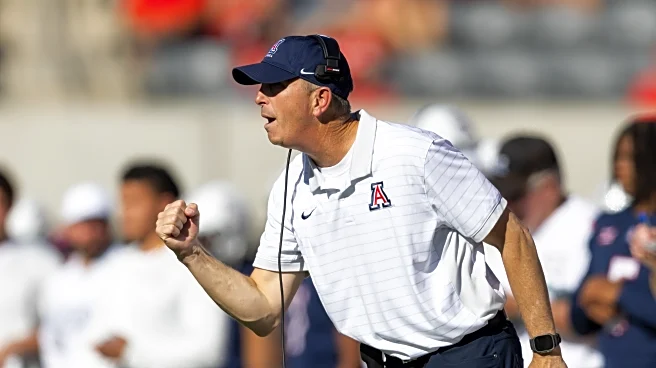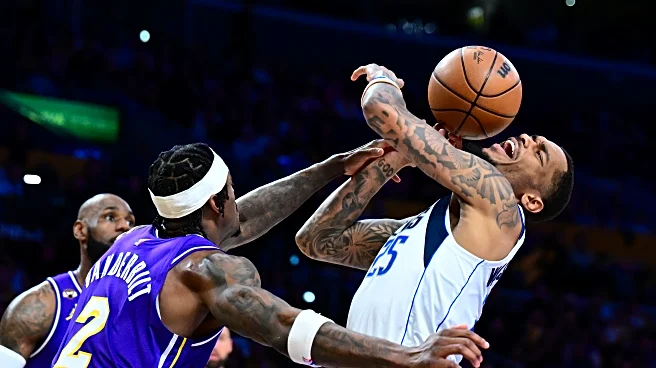After beating Kansas to get to six wins, the video boards inside Arizona Stadium proudly proclaimed the Wildcats were “going bowling.” Players mimicked bowling motions on the field, and in the locker room giant cardboard bowling pins were passed around in celebration.
That was on Saturday evening, and a little into Sunday, but not Monday. Arizona is like many college football teams that have a 24-hour rule related to thinking about the most recent game.
“We’re well past 24 hours, and so we’re heavy
into preparation for Cincinnati,” UA coach Brent Brennan said.
No. 22 Cincinnati (7-2, 5-1 Big 12) is one of three teams tied atop the conference standings with one loss. The Bearcats would make the league title game if they win out.
“This is what we think is the best football team we played this year,” Brennan said.
Here’s what else Brennan said at his press conference to open game week:
On Cincinnati: “They’ve done an outstanding job of adding to their roster, building a roster and then adding good players in the portal from it. The quarterback (Brendan Sorsby) is the best quarterback we’ve seen so far. He’s a really, really clean passer, and he’s extremely athletic. This is the most team speed I think we’ve seen.”
On Cincinnati WR Cyrus Allen: “He’s the best receiver we’ve played against. He is excellent, just a great combination of speed and talent, has the ability to finish. He’s tough. They’ve done an awesome job. And like I mentioned earlier, when you have somebody delivering the football with the accuracy and the confidence that Sorsby is, they present a real challenge that way.”
On Quincy Craig winning Big 12 Player of the Week: “You guys asked me the other night about just the rotation at running back and that part of it. I think if you’re going to have a good football team, you have to have more than one (running back). I just thought that that position, they take such a meeting, and having more than one has benefited us throughout the season, because there’s been time for players at that position have been nicked up or been dinged up in some way. It was awesome to see Quincy do that, I think that’s one of those things that’s also speaks to really good evaluation of him through the portal process and a good recruitment. That kid, if you spend any time with him, he just has great energy. He’s got a huge smile. He plays a lot of lot of enthusiasm, a lot of joy. He’s really been a great addition to our football team.”
On when he first thought Craig could make an impact: “It probably comes from spring practice. From the moment he showed up, he started ripping off like 60-yard runs in practice and and it was amazing. Because you evaluate a player, you recruit him, he chooses to come, you get him here, but you don’t really know. You’ve been watching tape. You’re like, okay, it’s still a projection. When we think about recruiting, like, no one bats 1.000 recruiting. Look at the NFL, no one bats 1.000 in the draft. I mean, how many first round picks don’t make it pass their first contract? So that’s such a big part of that evaluation process. But then when we started practicing, we start to get to see what it looks like. And right away, he started having a tremendous impact. Right away, he had instant respect of the team, because he was a super hard worker. And then when we got on the field football was good also, and he was effective in protection. The fact that he was a complete player, showed up really quickly.”
On Craig reaching the ball out for the pylon on his first TD: “I thought it was an incredible play. I thought we absolutely needed it in the moment of that game. And so it was really valuable. It’s kind of like the head coach going forward on fourth down and getting in or not getting. You get it, everyone’s like, great call. If you don’t get it everyone’s like, you’re an idiot. It’s just the way it is. And so it’s kind of a result thing. The devastation would have been had that ball gotten knocked out and been a touchback for Kansas. And we’ve seen that multiple times happen this season, so that’s not something that we encourage, but it was a hell of a football play.”
On Matthew Lado stepping in at left tackle: “When you get to a game, you go into a game of the game plan, but you don’t always know exactly how that’s going to show up until you start playing. And I thought those guys did a nice job of settling in and then finding some run game there in the second half was really, really valuable. And I thought Matt did a great job. I think he did a great job going in there, especially on that last drive, playing with a huge effort, physicality. And obviously we needed that because that was the situation in that moment, where that’s what we were kind of being given, and we took advantage of it. And it all happened because of those big guys up front.”
On trouble protecting the blind side: “We’re going to face those things. One time they got us, which happens, they made a good call and they executed it. And that happens sometimes. One of the times we made the wrong call up front, and so we didn’t get the protection all the way to where it needed to go, but that’s something we’ve already got to work on fixing yesterday. Obviously, there’s nothing more important to us than protecting Noah Fifita.”
On going with Lado over Rhino Tapa’toutai: “Rhino has been playing more on the right side, and this was on the left side.”
On freshman LB Myron Robinson: “I think he’s got an extremely high ceiling. For a player to step into that game, that physical of a game, I think he tied for the lead in tackles on our team. Was really effective, was flying around, made some outstanding football plays. It’s fun to finally see him start to come into his own, because he was hurt early in training camp or wasn’t really as available early on in the season. And it’s exciting to see him getting more and more comfortable. Because part of it also when you miss all those reps, is you miss all the schemes. You miss all that time in the scheme, I guess is a better way to say it. And so the opportunity for him now, the last few weeks, last month, to get more and more comfortable, to earn a little bit more playing time, to make some mistakes, to recover, to learn and then to get out there and play last weekend was really fun.”
On being excited about bowl eligibility but not satisfied: “When you start a season, at least in my head, like the first thing you want to do is, like, how fast can we get bowl eligible? Because you know that when you get to the postseason, you’re going to get a chance for an extra spring practice, basically, epending on when you play and how many games you win you get two, three, four weeks of extra practice. That is incredibly valuable for the freshmen that just got here in June, that part of it is so critical. That’s really important, but then you don’t want that to be the goal. Like that wasn’t the goal when we started in the fall. The goal wasn’t to just get to a bowl game. And so now we’re in a situation where we have three big-time games coming up, three excellent opponents, and two of the three are on the road, so incredibly challenging things. So how quickly can we enjoy this moment? Yes, it’s awesome. Yeah, hell yeah. We’re so excited. But we show up tomorrow and we get past this film, we are now diving head first into the into the game plan in the process to prepare for Cincinnati.”
On having community support: “I think it’s so important. And I think it’s really critical at an institution like this that is in a city like Tucson, and there’s no pro sports franchises, and you’re not sharing that market. The last job I had, we had the 49ers and the Warriors and the Giants and the A’s and Earthquakes, there were so many. And then there’s other universities. This (city) is so unique that way, so there absolutely is a ton of enthusiasm. I think that’s really a special thing about this place, is just the relationship the city of Tucson has with the university. And when our sports teams are playing well it’s exciting because it really is, everyone says it’s the front portion of the university, and it is because it is really public. And so the success or the failure of your sports programs is a really public thing. And when people are playing well and doing good stuff, it’s exciting for everybody.”
On mental health: “I lean really heavily into that space. It’s critical that we support our kids. I just think this generation is dealing with more stuff than any generation you’ve ever coached before. We have three full-time professionals in that space in our athletic department, it’s well resourced by the U of A. We are really, really open with our players … because I also think that sometimes players think when, if they choose to talk to somebody they’re going through a tough time, that somehow that information is going to get back to me. That never happens. That’s not what it’s there for. So trying to get our players in a place where they’re comfortable and they understand that we are just here to support them on their journey and whatever they need, in their mental health support, we will make sure they get the resources that they need.”
















